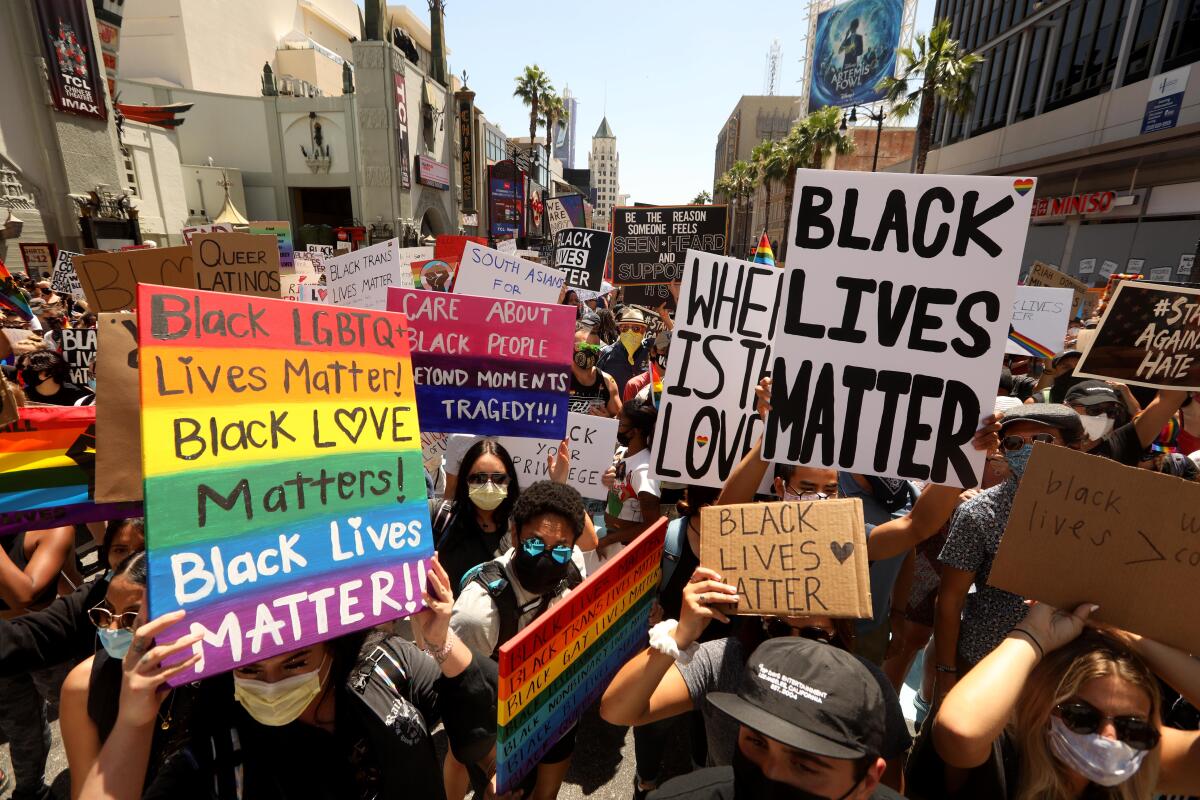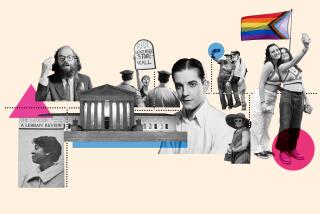Op-Ed: Fights for LGBTQ and racial justice have to go hand in hand

During a heated debate over a bill that would ban employment and housing discrimination because of sexual orientation, New York City Councilman Edward L. Sadowsky said “no democracy is safe unless it protects and guards zealously the rights of each minority.” This was on May 23, 1974.
Sadowsky was one of 19 who voted in support of the bill first introduced in 1971. Councilman Angelo J. Arculeo was one of the 22 who opposed, saying “it attempts to give legal identity to homosexual orientation and thereby mandate public acceptance.”
Oh, the horror.
The front-page New York Times article about the bill’s defeat reported that when the measure lost, supporters yelled “bigot” from the balcony. Protesters would later stage a sit-in at St. Patrick’s Cathedral.
That same day, the public heard a white New York police officer tell a Black elementary school student who had just been shot to “die you little f—.”
That statement was part of an hourlong recording played during the murder trial of former NYPD Officer Thomas Shea, who shot 10-year-old Clifford Glover in the back, killing him.
Shea, who drove an unmarked car and was in plainclothes the day of the shooting in April 1973, said Glover and Add Armstead — his 50-year-old stepfather with a thin face and receding hairline — fit the description of two Black suspects in their early 20s.
I’m pretty sure you can figure the rest out.
Shea said the child pointed a gun at him as he was running away. Hundreds of officers searched the sewers and streets for days looking for the gun. Some officers searched the home of Glover’s relatives without warrants looking for the gun. No gun was ever found.
“I was very, very scared,” the officer would later testify about his encounter with the 5-foot-tall, 90-pound fourth-grader he shot in the back from roughly 15 feet away.
A jury of 11 white men and one Black woman acquitted him.
Afterward, Shea was seen planting thank-you kisses on the cheeks of members of the jury at an Italian restaurant. It was like a scene from “The Godfather: Part II,” which was released later that year.
Fast-forward to 2021.
The LGBTQ community is still trying to get employment and housing protections, this time with the Equality Act, and people of color are still trying to get police accountability with the George Floyd Justice in Policing Act. Democrats — who control the House, the Senate and the White House — blame Republicans for the current holdup, which is an excuse they really should workshop before the 2022 midterm election.
When I think about a day like May 23, 1974, I see a day in the life of queer people of color, who for decades were made to feel as if they had to choose between their race and their queer identity.
Previous generations weren’t taught that some great Black writers and artists, such as Lorraine Hansberry and James Baldwin, were queer. That the first openly LGBTQ person to run for office was a World War II veteran by the name of Jose Sarria. Or that Bayard Rustin, an openly gay Black man, mentored Dr. Martin Luther King Jr. and organized the March on Washington.
Perhaps if previous generations were taught these things, queer people of color wouldn’t need to spend time trying to determine which aspect of their existence was less likely to get them killed. Judging from the current attempts to prevent the teaching of LGBTQ history and critical race theory in school, it’s safe to assume many want to keep things as they were.
It was actually quite remarkable to comb through newspaper articles from nearly 50 years ago and read the same arguments being made with nearly the same scenarios attached to them.
On that day in 1974, Councilman Archie Spigner said he did not like the idea of LGBTQ teachers influencing children. Last year, Steven Arauz was fired for being gay from Forest Lake Education Center, an Adventist school in Florida, which received public money.
In 1974, an officer on the recording can be heard gloating, “The good guys won,” after Glover was shot. Recently, the public saw video of Louisiana state troopers beating and ridiculing Ronald Greene, who would later die.
Audre Lorde — the self-described “black, lesbian, mother, warrior, poet” — wrote the anguished poem “Power” about Shea’s acquittal for Glover’s killing. In that work, she referenced statements heard in the police recording. Fittingly, it was also Lorde who said, “There is no such thing as single-issue struggle because we do not live single-issue lives.”
***
In June 2017, Black Lives Matter supporters in Minneapolis stopped the Pride parade multiple times to protest police officers being allowed to participate following the acquittal of Jeronimo Yanez, the officer who killed Philando Castile in 2016.
Last year, BLM and Pride held combined marches all over the country. The partnership wasn’t always smooth, but it would be a pity if society’s return to post-pandemic normalcy leads to a break in this alliance.
I remember covering the BLM solidarity march in West Hollywood — and being struck at hearing Breonna Taylor’s name mentioned alongside Black transgender women whose lives were also lost due to violence. Women such as Nina Pop, who was found stabbed to death in her apartment just weeks before George Floyd was murdered. A death that received little media attention despite Pop being the fifth transgender woman of color killed in the U.S. in a month.
In years past, those two names would have been heard at two different protests, chanted by two different groups of people, who for too long believed that these are two different fights.
But they’ve always been linked together. Which is why together is the best way to fight.
@LZGranderson
More to Read
A cure for the common opinion
Get thought-provoking perspectives with our weekly newsletter.
You may occasionally receive promotional content from the Los Angeles Times.











